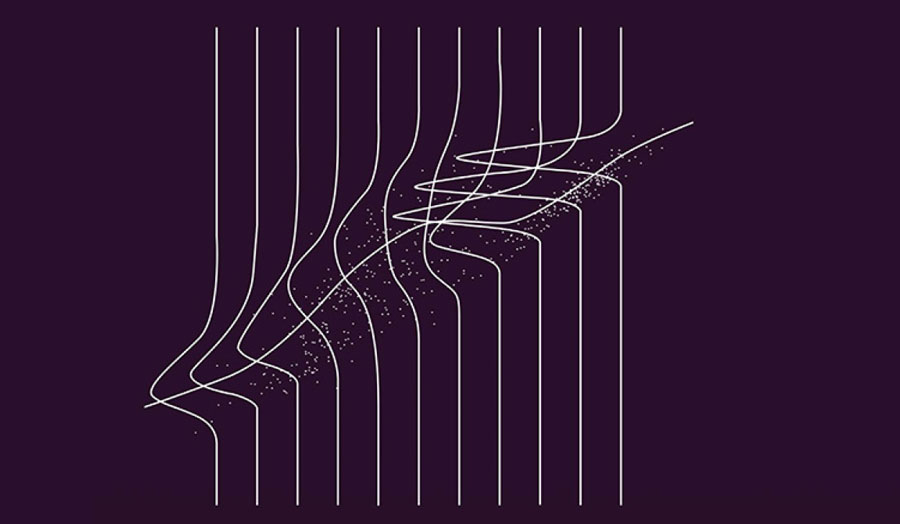Apply for this course
Please select when you would like to start:
If you're a UK applicant wanting to study full-time starting in September, you must apply via UCAS unless otherwise specified. If you're an international applicant wanting to study full-time, you can choose to apply via UCAS or directly to the University.
If you're applying for part-time study, you should apply directly to the University. If you require a Student visa, please be aware that you will not be able to study as a part-time student at undergraduate level.
Why study this course?
Our Mathematical Sciences (including foundation year) BSc (Hons) explores the modern application of mathematics in different disciplines, including finance, programming, project management and statistics.
This four-year bachelor’s course is suitable if you don’t have traditional qualifications or can’t meet the necessary requirements to enter our standard three-year degree. It has a built-in foundation year, which is designed to prepare you for study at undergraduate level by equipping you with basic skills in mathematics and its applications, such as computer science.
We are accredited by the IMA
We are accredited by the Institute of Mathematics and its Applications (IMA) for the purpose of meeting in part the educational requirement for chartered status
Choose the modules that interest you most
This course offers a wide variety of optional modules, including financial mathematics, coding theory, and algebra and analysis
Learn the skills you need to reach your full potential
This four-year degree course includes an intensive foundation year (Year 0) which will provide you with the skills required for your subsequent three years of study
Course modules
The modules listed below are for the academic year 2024/25 and represent the course modules at this time. Modules and module details (including, but not limited to, location and time) are subject to change over time.
Year* 0 modules
Year 1 modules
Year 2 modules
Year 3 modules
Cyber Security Fundamentals
This module currently runs:all year (September start) - Wednesday afternoon
(core, 30 credits)
On this module students will learn the fundamental knowledge concerning computer security, basic cyber threats and the corresponding detection and defence techniques. Core security concepts, terminology, technologies and professional cyber security skills will be introduced via case studies and laboratory experiments.
Read full detailsIntroduction to Robotics and Internet of Things
This module currently runs:all year (September start) - Wednesday morning
(core, 30 credits)
This module aims to introduce basic hardware and software elements relevant to robotics and internet of things (IoT) at foundation level (level 3). In particular, the module is designed to provide students with an introductory overview and practical experience in design and development of a simple system involving elements of robotics and IoT.
The module covers the necessary principles and theory through formal lectures/seminars followed by comprehensive laboratory practice involving workshop-based exercises and a case study.
Read full detailsMathematics
This module currently runs:all year (September start) - Monday morning
(core, 30 credits)
This module introduces students to a range of mathematical techniques involving algebraic properties and graphs of the algebraic, logarithm, exponential and trigonometric functions. Furthermore the module introduces mathematical techniques of differentiation and integration of simple functions.
Read full detailsProgramming
This module currently runs:all year (September start) - Monday afternoon
(core, 30 credits)
The module introduces students to theoretical concepts underpinning computer software design; and to programming using a high-level language concentrating on sequence, selection, iteration (loops) and list processing. It is assessed by three individual online tests (30%, 30%, and 40% weighting).
It aims to enable the student to use a programming language in a familiar and confident way in a variety of practical situations, and to use an integrated programming development environment competently.
It also enables the student to design and write simple programs during workshop time, using the programming language constructs described in the syllabus below.
Data Analysis
(core, 15 credits)This module introduces methods of analysing data using appropriate statistical software. Descriptive statistics and statistical techniques that are useful to present, analyse and make inferences about data are also introduced. A selection of suitable software (e.g. Excel, SPSS, R) will enable students to analyse data in order to make informed decisions.
Financial Mathematics
This module currently runs:autumn semester - Thursday afternoon
(core, 15 credits)
This module develops the mathematical and statistical tools that are used in the mathematics of finance. This module introduces the basic terminologies used in finance and develops the mathematical techniques to solve real-life problems in finance. The module will provide an introductory knowledge of Excel, and Excel built functions in financial computing. The application of suitable software (e.g. Excel) will enable students to solve financial problems in order to draw valid conclusions and make informed decisions.
Read full detailsGraph Theory
(core, 15 credits)In this module, we introduce the basic concepts of graph theory, focusing on finite graphs. These include numerical invariants of graphs and methods for calculating them; how to navigate through graphs (including the method that lies behind the resolution of the Königsberg problem discussed above); vertex and edge colourings of graphs and other numerical invariants of graphs; the conditions under which a graph is planar.
IT for Mathematics
(core, 15 credits)This module introduces a range of numerical approximation methods for solving a variety of mathematical problems, including iterative methods for solving nonlinear equations and systems of linear equations.
There is also an introductory course on LaTeX, which is a high-quality document preparation system commonly used for writing, editing, and designing mathematical documents and technical reports.
Logic and Mathematical Techniques
This module currently runs:all year (September start) - Thursday morning
(core, 30 credits)
This module develops a range of mathematical techniques including set theory, logic, relations and functions, algebra, differentiation and integration. The techniques provide the foundation for further study of Mathematics, Computer Science and Computer Games Programming and Computer Systems Engineering.
Read full detailsMAPLE Programming
This module currently runs:autumn semester - Tuesday morning
(core, 15 credits)
This module introduces a mathematical programming package that is commonly used for solving a variety of problems, where there is an expectation of some knowledge of calculus, linear algebra.
The application of these techniques, through the medium of mathematical problems enables the student to become proficient in the use of algebraic software which is used in most mathematical related jobs such as working in industry, financial markets, and teaching.
Read full detailsMathematical Proofs
This module currently runs:autumn semester - Friday afternoon
(core, 15 credits)
This module develops the skills necessary to support academic study at degree level. It will also develop reflective learning and action planning via the Personal Development Planning (PDP) process. The first term topics will look into history of mathematics, development of modern number system and introduce idea of mathematical proofs. Different proof techniques will be covered using examples from Set Theory and Number Theory.
Read full detailsAlgebra
(core, 15 credits)The module builds on and extends concepts learned in A-Level Mathematics such as complex numbers, vectors, and matrices. This module serves as an introduction to linear algebra methods, which are central in modern mathematics, having found applications in many other sciences and in our everyday life. The module covers basic mathematical techniques of linear algebra such as Systems of linear equations and Gaussian elimination, Matrices and Determinants, and Diagonalisation. The contents covered and the skills developed are fundamental to the development of mathematical competence. Linear algebra forms an important foundation for further studies in Mathematics, Finance, Statistics and Engineering.
Differential Equations
This module currently runs:spring semester - Wednesday morning
(core, 15 credits)
The module extends the students’ knowledge of the techniques of calculus and introduces the concept of differential equations.
This module aims to give students a thorough understanding of the analytical techniques available to solve first and second order ordinary differential equations.
Read full detailsFurther Mathematical Techniques
This module currently runs:autumn semester - Thursday morning
(core, 15 credits)
The module covers basic mathematical techniques of differential and integral calculus. The module builds on and extends concepts learned in A-Level Mathematics. The contents covered and the skills developed are fundamental to the development of mathematical competence. Calculus forms an important foundation for further studies in Mathematics, Finance, Statistics and Engineering.
Read full detailsProject Management
This module currently runs:autumn semester - Wednesday morning
(core, 15 credits)
This module introduces a selected range of Operational Research techniques that are commonly used for solving a variety of small to medium size problems, through the medium of spreadsheet and other suitable software. It also enables the student to investigate real-life problems of business and industrial problems of varied complexity.
Read full detailsComputational Mathematics
(option, 30 credits)This module enables the student to further develop and apply numerical techniques to a range of problems including the solution of ordinary differential equations related to both physical and financial/economic models.
This module enables the student to further develop and apply numerical techniques to a range of problems including the solution of ordinary differential equations related to both physical and financial/economic models.
The aims are:
To enable students to apply approximation techniques to problems of both theoretical and practical importance and understand the cause of and interpret the degree of error involved.
To prepare students with the tools necessary for solving a range of problems in situations suitably described by ordinary differential equations and by difference equations.
To understand modelling with linear and nonlinear dynamical systems and iterative methods of solution.
To enable students to understand and manipulate coded programmes for software packages such as Maple for solving larger problems.
To develop students’ knowledge, confidence and problem-solving skills leading to further academic progression and future employability in this area.
Group Theory and Vector Spaces
This module currently runs:all year (September start) - Monday morning
(option, 30 credits)
The topics covered in the first part of this module is to introduce students to the abstract algebraic structures of groups, which arise from the ideas of symmetries and of vector and matrix calculus respectively. These two primary examples of algebraic structures have applications across science and engineering, and also provide a firm foundation of necessary basic algebraic notions for the student to further their study mathematical study.
The aim of the second part of the module is to introduce students to the abstract algebraic structures of vector spaces, developing on the material on linear algebra learnt previously. This primary example of algebraic structures has applications across science and engineering, and also provides a firm foundation of necessary basic algebraic notions for the student to further their mathematical study.
Read full detailsStatistical Methods and Modelling Markets
This module currently runs:all year (September start) - Monday afternoon
(option, 30 credits)
The module covers mathematical and statistical modelling techniques that are applied in making decisions in areas of finance. It also enables the student to investigate real-life statistical data. This module introduces important financial concepts and develops statistical modelling techniques. Statistical regression models are applied to financial data (e.g., credit scoring, default time analysis) and mathematical modelling of stock and option prices is investigated. A selection of suitable software (e.g., Excel, R, SPSS) will enable students to analyse data in order to make informed decisions. The students will develop skills in statistical and mathematical modelling of real data to aid future employability
Read full detailsAcademic Independent Study
This module currently runs:spring semester - Wednesday afternoon
autumn semester - Wednesday afternoon
(core, 15 credits)
This module serves as a core module for all maths students (and optional for Data Science students) to do a one-semester project in the broader sense. The feature of the module is summarised as follows.
1. Students will follow their own interest to pursue an individualised study independently under staff supervision.
2. Students taking this module with the same supervisor may study the same subject but the assessments should be individualised.
3. The allocation of supervisors to students should be done at the end of year two. Students can take this module in either autumn or spring period.
The programme of study is very much individualised and there is a variety of format. The following are just two typical examples: (a) Pursue an investigative study on a particular topic, with an assessment of written report plus viva, and (b) A self-negotiated study in any subject area following a printed textbook or online material, assessed by a coursework consisting of a mixture of solutions to exercise questions, a written report, and a viva (oral presentation). In the later case, there must be an “investigative and independent factor” in the study. Any other innovative format is encouraged.
The module aims to
1. Provide students with an opportunity to pursue an academic area of interest independently, subject to the availability of an appropriate supervisor, where a taught module is not available.
2. Develop students’ ability to search the internet and library for useful information.
3. Enrich students’ experience of self-negotiated study.
4. Improve students’ employability by enhancing their skills through report writing and reflection on independent learning.
Career Development Learning
This module currently runs:spring semester - Wednesday afternoon
autumn semester - Wednesday afternoon
(core, 15 credits)
The module enables students to undertake an appropriate, short professional activity related to their course at level 6 with a business or community organisation and to gain credit for their achievements. The activity can be professional training or certification, a volunteering activity, employment through internal or external work-based placements, research-related activities, business start-up projects, entrepreneurship programs and more. Please see the complete list of accepted activities on WebLearn.
Students are expected to engage in any one or combination of career development learning activities for a total of ~70 hours which should be recorded clearly in a tri-weekly learning log – part of the portfolio. The ~70 hours can be completed in ~30 working days in FT mode or spread over a semester in PT mode.
Students are expected to complete a total of ~150 hours, 70 hours of which is direct engagement in any one or combination of career development learning activities. Progress should be recorded clearly in tri-weekly learning logs which are part of the portfolio. The ~150 hours can be completed in ~35 working days in FT mode or spread over a semester in PT mode.
Students should register for the module to be briefed, undergo induction and module planning and have their career development learning activity approved before they take up the opportunity. Students must be made aware that both the "Learning Agreement" (LA) and relevant "Health and Safety (H&S) checklist", where applicable, must be approved before starting the learning activity. Activities started without prior explicit supervisor approval will not be accepted.
The module aims to provide students with the opportunity to:
• Gain a valuable experience of the working environment and the career opportunities available upon graduation.
• Sharpen critical thinking, creative problem-solving and the ability to articulate solutions correctly to decision-makers and budget-holders alike.
• Undertake a career development learning activity appropriate to their academic level to gain exposure and access to professional networks.
• Extend learning experience by applying and building on their academic skills and abilities by tackling real-life problems through enrichment and extracurricular programs related to student subject areas.
• Enhance existing skills and master new ones through a structured personal and Professional Development Plan (PDP).
Integral and Vector Calculus
This module currently runs:all year (September start) - Friday morning
(core, 30 credits)
The module extends the students’ knowledge of the techniques of calculus and introduces the concept of multivariable Calculus as well as calculus of vectors.
This module introduces Vector-Valued Functions and extends ideas of calculus of one dimension to Vector-Valued Functions.
Prior knowledge: Calculus and Linear Algebra
Read full detailsMathematical Modelling
This module currently runs:all year (September start) - Tuesday morning
(core, 30 credits)
This module develops a rigorous approach to the whole process of solving problems arising from real life scenarios and the module consists of providing solutions to a number of such problems. For each given problem, the process of dealing with it includes an initial analysis, identification of the main factors involved, establishment of a differential or difference equation as a mathematical model of the problem, analytical and/or numerical analysis to solutions of the equation, making predictions and drawing conclusions to the model, and feedback to solving the problem.
The module aims to
1. Introduce the process of model building from a non-mathematical description of a physical or industrial process or in a business application.
2. Introduce the idea of mathematical modelling as a means of solving real problems.
3. Present powerful tools of differential/difference equations to analyse the models in order to make appropriate predictions.
4. Develop the student's ability to work effectively in-groups.
5. Improve the student's communication skills through report writing and presentation.
Pre-requisite knowledge: MA5011 Further Calculus and MA5052 Differential Equations (studied or Co-requisite)
Analysis
This module currently runs:autumn semester - Thursday morning
(option, 15 credits)
This module extends students’ knowledge of calculus real and complex variable, providing greater depth and rigour for these essential topics.
The aim of the module is to develop a rigorous approach to the analysis of functions of a real and a complex variable and to provide a firm foundation of necessary notions for the student to further their mathematical study.. Further topics in complex integration are also covered and students are introduced to applications of these topics to improper integration of functions of a real variable
Pre-requisite knowledge: MA5011 Further Calculus and MA5052 Differential Equations (studied or Co-requisite)
Category Theory
This module currently runs:spring semester - Thursday morning
(option, 15 credits)
The module is designed to be an introduction to Category Theory. Category theory takes a holistic approach when dealing with objects with arrows linking them, while set theory looks at the individual elements and how the mappings effect each element between sets. Instead of focusing on different elements that hold a given structure, category theory focuses on emphasising the morphisms/actions between the objects.
Categories express abstractions of other mathematical concepts. Abstraction recognises specific situations and common features between objects.
Cryptography and Number Theory
This module currently runs:spring semester - Friday afternoon
(option, 15 credits)
The module is an introduction to modern ideas in cryptography. It proves the background to the essential techniques and algorithms of cryptography in widespread use today, as well as the essentials of number theory underlying them.
The module looks at symmetric ciphersystems and their use in classical cryptography as well as public key systems developed to support internet commerce and deliver data security for private individuals.
The module will enable students to understand the mathematics underpinning key algorithms, how they operate using small values and how computer packages such as MAPLE allow us to apply them at a more realistic scale.
Read full detailsError Correcting Codes
This module currently runs:autumn semester - Friday afternoon
(option, 15 credits)
The module is an introduction to modern ideas in error correcting codes. It provides the background to the essential techniques and algorithms in widespread use today, as well as the essentials of number theory and finite field theory underlying them.
Error correcting codes are an important part of the data communications theory and allow a message to be recovered even if errors have been introduced during transmission. The elegant mathematics of finite field theory is introduced to develop multiple error correcting codes with a wide range of communications applications.
Financial Modelling and Forecasting
This module currently runs:all year (September start) - Tuesday afternoon
(option, 30 credits)
The module introduces the students to financial forecasting using modern statistical modelling techniques. Its aim is to prepare the student for work in a quantitative commercial or scientific environment. Students will be developing problem solving skills. For each given problem, the process of dealing with it includes, searching for appropriate data sets, establishing the right statistical/financial techniques to use, fitting appropriate models, critically appraising the models using diagnostic model tools and finally interpreting the models and drawing conclusions.
Read full detailsMathematics of Infinity
(option, 15 credits)The module is designed to be accessible to both mathematics and non-mathematics students alike. The prerequisite for this module is basic arithmetic and desire to think about abstract ideas.
This module is centred around Cantor’s theory of infinite sets. The historical background of the idea of infinity will be given from the ancient Greek philosophers up to Immanuel Kant. The main ideas behind the Cantor’s theory of transfinite numbers will be developed and then we will look at some of the consequences of Cantor’s work present in Mathematics, Computer Science and Philosophy.



.jpg)



.jpg)






